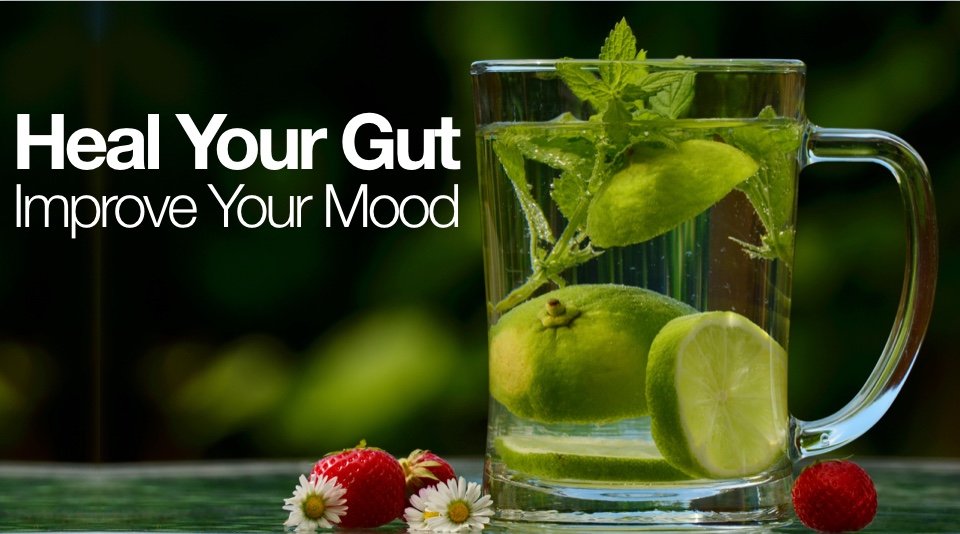The Gut-Brain Axis builds on the idea that our gut influences our neurobiology – heal the gut for good brain health. This axis involves chemical signals that occur between the gastrointestinal tract and nervous system, influenced via intestinal microbiota and its communication with the brain via several physiological pathways.
In the future, it’s possible that many mental health conditions will be treated via amendment of our intestinal microbial populations.
Treating the gut is a complex task and requires working alongside a health practitioner. Its approach however can be broken down into a basic foundation of 4 steps:
 Treating constipation enables the gut to receive other types of care. Ask your practitioner about these potential treatments:
Treating constipation enables the gut to receive other types of care. Ask your practitioner about these potential treatments:
- Heal the gut
- Avoid what harms
- Give what heals
- Fix metabolic problems
1. Heal The Gut
It is important to support the gut to heal by:- Treating dysbiosis
- Treating constipation
- Decreasing inflammation
Dysbiosis and Microbes
Dysbiosis is an imbalance in the microbial environment of the gut, such as cases of bacterial overgrowth. Probiotics, are important and assist with introducing helpful flora and discouraging the growth of harmful flora in the gut. Probiotics and fermented foods such as kefir, kombucha, and fermented cabbage are recommended. Additionally, saccharomyces boulardii can help to balance the microbiota. Saccharomyces boulardii is a type of yeast found in the skin of lychee fruit. Just as there are helpful and harmful bacteria, there are helpful and harmful yeasts.Avoid Constipation
Constipation occurs when the movement of material through the gut (peristalsis) is sub-optimal. The stool is harder and/or stooling is less frequent than usual, such as once or twice a week Constipation may also be considered if stooling does not occur at least once a day. Constipation, if present, is the first thing that needs to be treated.Smart Care can relieve Constipation
 Treating constipation enables the gut to receive other types of care. Ask your practitioner about these potential treatments:
Treating constipation enables the gut to receive other types of care. Ask your practitioner about these potential treatments:
- Increasing fiber intake (vegetables, psyllium husk, pectin)
- Increasing fluid intake (water is best)
- Exercise (especially swimming since it engages the entire body)
- Supplements like Vitamin C and Magnesium
- Certified Aloe Vera in capsules or the plant itself
- Senna (an herb found in “Smooth Move Tea”)
- Enema ONLY if severe “impacted” constipation is present
Treat Digestive Inflammation to Heal The Gut
Inflammation of the digestive tract degrades its ability to function. The use of anti-inflammatories like essential fatty acids (EFA’s), Aloe, Quercetin, Resveratrol, Curcumin, Marshmallow root, Slippery Elm, and bioflavonoids may also be appropriate. Probiotics also help control inflammation (in addition to helping with dysbiosis). Inflammation can also be treated through dietary change.2. Avoid What Harms
In addition to balancing the flora in the gut, enabling peristalsis, and healing gut-tissues, another aspect is about what you don’t put into your body in the first place. Here are a few basic things to avoid:- Gluten and casein (while these aren’t problems for everyone, they are common for many people)
- Exitotoxins (caffeine, MSG, food dyes)
- Phenolics (found in grapes and strawberries)
Cravings and Sensitivities
We tend to crave foods which we are most sensitive to. Cravings can be an indicator that a food should be avoided.3. Choose Quality Foods to Heal The Gut
You can also heal the gut by choosing what you do put in it. Eat fresh, unprocessed, unrefined, organic, whole foods. Foods with these qualities are anti-inflammatory. Since it’s not always possible to only eat organic foods, it is recommended to prioritize:- organic chicken
- rice
- pears
- apples
- peppers
- celery
- strawberries
- cherries
- grapes
- spinach
- lettuce
- potatoes
Proteins, Fats and Juices
Frequent protein intake is beneficial, along with raw foods, fermented foods, and sources of good fat like EFA’s. Juicing is a great way to get lots of vital nutrients in a concentrated form.Get Variety in Your Eating Style to Heal The Gut
Along with what you eat, how you eat is important. Eating a variety of foods is key, along with eating rotationally, since we evolved to eat what foods were in season.4. Fix Metabolic Problems – including with Movement and Rest
Fixing the overarching metabolic processes of your body is crucial to healing your gut and any associated symptoms. Exercise is important. In addition to moving your body, resting your body is also important (melatonin and 5-htp may be appropriate sleep aids – check with your practitioner). Exercise helps detoxify your body by sweating and also enables peristalsis, which is another way the body rids itself of toxins. You can also fix metabolic problems with supplements like folinic acid (B vitamins), magnesium, glutathione, N-acetyl cysteine (NAC), and anti-inflammatories. Always consult with a qualified practitioner.Consult with a Practitioner
Mindd Foundation recommends that you seek professional support from a qualified practitioner to ensure correct diagnosis and appropriate treatment recommendations. Mindd practitioner directory – Australia Mindd practitioner directory – InternationalReferences:
- https://www.ncbi.nlm.nih.gov/pubmed/25760553
- https://bmcmedicine.biomedcentral.com/articles/10.1186/1741-7015-9-24
- Dr Nancy O’Hara – board certified Paediatrician. Clinical Practice (Dr O’Hara is on the Mindd Foundation Board of Scientific Advisers.)
- http://www.greenmedinfo.com/blog/natural-approach-overcoming-depression
- https://www.ncbi.nlm.nih.gov/pubmed/27113121
- http://journals.sagepub.com/doi/abs/10.1177/0004867416676895
- http://www.greenmedinfo.com/blog/dozen-uses-probiotics-will-surprise-you
- https://genomemedicine.biomedcentral.com/articles/10.1186/gm228
- http://www.sciencedirect.com/science/article/pii/S0889159109001962



